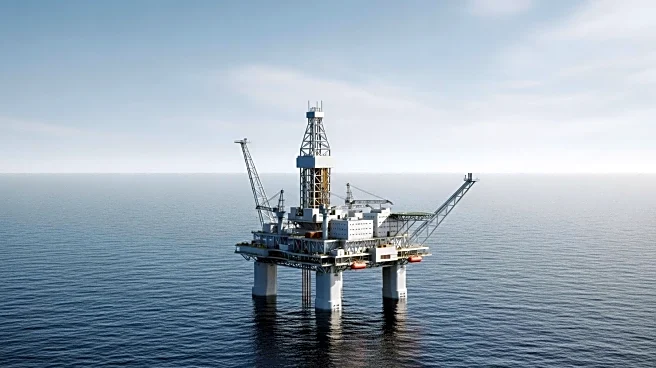What's Happening?
ExxonMobil, a leading U.S. energy company, has significantly increased oil production in Guyana, reaching 685,000 barrels per day in August. This rise in output is attributed to the start-up of the fourth Floating Production Storage and Offloading (FPSO) facility, named One Guyana, which began operations on August 7. The facility produced an average of 75,000 barrels per day last month and delivered its first 1-million-barrel crude cargo for export in late August. The consortium led by ExxonMobil controls all oil and gas output in Guyana, and the new facility has expanded the country's output capacity beyond 900,000 barrels per day. The government of Guyana reported that its oil fund received $212.88 million from the sale of oil cargoes last month, contributing to a total of $1.65 billion received this year.
Why It's Important?
The expansion of oil production in Guyana by ExxonMobil is a significant development for the country's economy and the global energy market. Guyana's increased output strengthens its position as a key player in the oil industry, potentially attracting more investment and boosting economic growth. For ExxonMobil, this expansion aligns with its strategic goal of producing 1.7 million barrels of oil equivalent per day by 2030 in Guyana, enhancing its global production capabilities. The increased revenue from oil sales also provides Guyana with more resources to invest in infrastructure and social programs, potentially improving the standard of living for its citizens.
What's Next?
ExxonMobil has greenlit its seventh project in Guyana, named Hammerhead, which is expected to further increase production capacity. This project is part of ExxonMobil's long-term strategy to expand its operations in Guyana and achieve its production goals by 2030. The continued development of oil infrastructure in Guyana may lead to further economic benefits and increased geopolitical significance for the country. Stakeholders, including the Guyanese government and international investors, will likely monitor the progress of these projects closely, assessing their impact on the region's economic and environmental landscape.
Beyond the Headlines
The rapid expansion of oil production in Guyana raises questions about environmental sustainability and the long-term impact on the region's ecosystems. As Guyana becomes a more prominent player in the oil industry, it may face increased scrutiny from environmental groups and international bodies concerned with climate change and ecological preservation. Balancing economic growth with environmental responsibility will be a critical challenge for both ExxonMobil and the Guyanese government.










